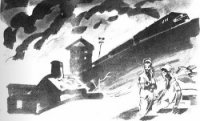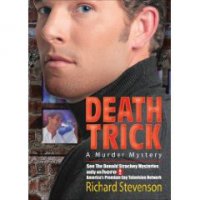Watership Down - Adams Richard George (читать книги бесплатно полностью без регистрации TXT) 📗
Other rabbits were making their way along the run and Strawberry spoke to several of them, more than once remarking that he would enjoy taking their new friends across the field. Hazel began to realize that he liked Strawberry. On the previous day he had been too tired and bewildered to size him up. But now that he had had a good sleep, he could see that Strawberry was really a harmless, decent sort of fellow. He was touchingly devoted to the beautiful Nildro-hain; and he evidently had moods of gaiety and a great capacity for enjoyment. As they came up into the May morning he hopped over the ditch and skipped into the long grass as blithe as a squirrel. He seemed quite to have lost the preoccupied air that had troubled Hazel the night before. Hazel himself paused in the mouth of the hole, as he always had behind the bramble curtain at home, and looked out across the valley.
The sun, risen behind the copse, threw long shadows from the trees southwestward across the field. The wet grass glittered and nearby a nut tree sparkled iridescent, winking and gleaming as its branches moved in the light wind. The brook was swollen and Hazel's ears could distinguish the deeper, smoother sound, changed since the day before. Between the copse and the brook, the slope was covered with pale lilac lady's-smocks, each standing separately in the grass, a frail stalk of bloom above a spread of cressy leaves. The breeze dropped and the little valley lay completely still, held in long beams of light and enclosed on either side by the lines of the woods. Upon this clear stillness, like feathers on the surface of a pool, fell the calling of a cuckoo.
"It's quite safe, Hazel," said Cowslip behind him in the hole. "I know you're used to taking a good look round when you silflay, but here we generally go straight out."
Hazel did not mean to alter his ways or take instructions from Cowslip. However, no one had pushed him and there was no point in bickering over trifles. He hopped across the ditch to the further bank and looked round him again. Several rabbits were already running down the field toward a distant hedge dappled white with great patches of maybloom. He saw Bigwig and Silver and went to join them, flicking the wet off his front paws step by step, like a cat.
"I hope your friends have been looking after you as well as these fellows have looked after us, Hazel," said
Bigwig. "Silver and I really feel at home again. If you ask me, I reckon we've all made a big change for the better. Even if Fiver's wrong and nothing terrible has happened back at the old warren, I'd still say we're better off here. Are you coming along to feed?"
"What is this business about going to feed, do you know?" asked Hazel.
"Haven't they told you? Apparently there's flayrah to be had down the fields. Most of them go every day."
(Rabbits usually eat grass, as everyone knows. But more appetizing food-e.g., lettuce or carrots, for which they will make an expedition or rob a garden-is flayrah.)
"Flayrah? But isn't it rather late in the morning to raid a garden?" said Hazel, glancing at the distant roofs of the farm behind the trees.
"No, no," said one of the warren rabbits, who had overheard him. "The flayrah's left in the field, usually near the place where the brook rises. We either eat it there or bring it back-or both. But we'll have to bring some back today. The rain was so bad last night that no one went out and we ate almost everything in the warren."
The brook ran through the hedgerow, and there was a cattle wade in the gap. After the rain the edges were a swamp, with water standing in every hoofprint. The rabbits gave them a wide berth and came through by another gap further up, close to the gnarled trunk of an old crab-apple tree. Beyond, surrounding a thicket of rushes, stood an enclosure of posts and rails half as high as a man. Inside it, the kingcups bloomed and the brook whelmed up from its source.
On the pasture nearby Hazel could see scattered, russet-and-orange-colored fragments, some with feathery light green foliage showing up against the darker grass. They gave off a pungent, horsy smell, as if freshly cut. It attracted him. He began to salivate and stopped to pass hraka. Cowslip, coming up nearby, turned toward him with his unnatural smile. But now Hazel, in his eagerness, paid no attention. Powerfully drawn, he ran out of the hedgerow toward the scattered ground. He came to one of the fragments, sniffed it and tasted it. It was carrot.
Hazel had eaten various roots in his life, but only once before had he tasted carrot, when a cart horse had spilled a nose bag near the home warren. These were old carrots, some half eaten already by mice or fly. But to the rabbits they were redolent with luxury, a feast to drive all other feelings out of mind. Hazel sat nibbling and biting, the rich, full taste of the cultivated roots filling him with a wave of pleasure. He hopped about the grass, gnawing one piece after another, eating the green tops along with the slices. No one interrupted him. There seemed to be plenty for all. From time to time, instinctively, he looked up and sniffed the wind, but his caution was half-hearted. "If elil come, let them," he thought. "I'll fight the lot. I couldn't run, anyway. What a country! What a warren! No wonder they're all as big as hares and smell like princes!" "Hello, Pipkin! Fill yourself up to the ears! No more shivering on the banks of streams for you, old chap!"
"He won't know how to shiver in a week or two," said Hawkbit, with his mouth full. "I feel so much better for this! I'd follow you anywhere, Hazel. I wasn't myself in the heather that night. It's bad when you know you can't get underground. I hope you understand."
"It's all forgotten," answered Hazel. "I'd better ask Cowslip what we're supposed to do about taking some of this stuff back to the warren."
He found Cowslip near the spring. He had evidently finished feeding and was washing his face with his front paws.
"Are there roots here every day?" asked Hazel. «Where-» He checked himself just in time. "I'm learning," he thought.
"Not always roots," replied Cowslip. "These are last year's, as you'll have noticed. I suppose the remains are being cleared out. It may be anything-roots, greenstuff, old apples: it all depends. Sometimes there's nothing at all, especially in good summer weather. But in hard weather, in winter, there's nearly always something. Big roots, usually, or kale, or sometimes corn. We eat that too, you know."
"Food's no problem, then. The whole place ought to be full of rabbits. I suppose-"
"If you really have finished," interrupted Cowslip, "-and there's no hurry; do take your time-you could try carrying. It's easy with these roots-easier than anything except lettuce. You simply bite onto one, take it back to the warren and put it in the great burrow. I generally take two at a time, but then I've had a lot of practice. Rabbits don't usually carry food, I know, but you'll learn. It's useful to have a store. The does need some for their young when they're getting bigger; and it's particularly convenient for all of us in bad weather. Come back with me and I'll help if you find the carrying difficult at first."
It took Hazel some trouble to leam to grip half a carrot in his mouth and carry it, like a dog, across the field and back to the warren. He had to put it down several times. But Cowslip was encouraging and he was determined to keep up his position as the resourceful leader of the newcomers. At his suggestion they both waited at the mouth of one of the larger holes to see how his companions were shaping. They all seemed to be making an effort and doing their best, although the smaller rabbits-especially Pipkin-clearly found the task an awkward one.
"Cheer up, Pipkin," said Hazel. "Think how much you'll enjoy eating it tonight. Anyway, I'm sure Fiver must find it as hard as you: he's just as small."




